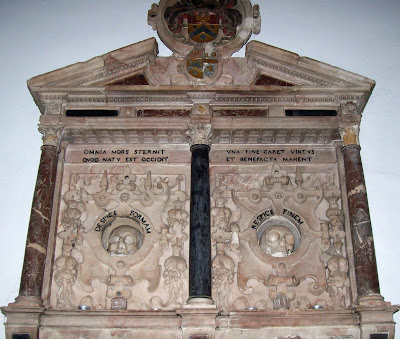Looking for John Holyman in Edward Hollyman's Will of 1617
Just to remind all, the William listed in the last post is the uncle of Ezekiel Holliman, one of the founders of the Baptist Church in Rhode Island and the person who baptized Roger Williams, an architect of American religious liberties. The Edward Hollyman in this post is also Ezekiel's uncle. John Holyman (see Post When we Were English, Part XVII), a brother of William and Edward, is Ezekiel's father.
So here we are knowing Bishop John Holyman (1495 - 1558), devout Roman Catholic who burned Protestants at the stake during the reign of Mary Tudor, is a great uncle or second or so cousin of Ezekiel. Now in all this where is the mysterious John Holyman of Tring (1572 - 1650), believed by many to be the founder of American Hollimans in Virginia?
 The parish church in Aldbury, located a few miles east of Tring, Hertfordshire. Are our relatives buried here also? Photo by Barbara Holliman, 2010.
The parish church in Aldbury, located a few miles east of Tring, Hertfordshire. Are our relatives buried here also? Photo by Barbara Holliman, 2010.In the last posting we explored the 1623 will of William Holyman of Tring, son of Leonard Holyman. In this article we reproduce below from the Hertfordshire Archives, the will of Edward Hollyman of Aldbury, brother of William. Aldbury is only a few miles from Tring. Edward lived from 1546 to 1617, and spelled his name with two 'L's. Edward was more prosperous listing furniture and household items to be dispersed as well as land holdings. Note brother William Holyman witnessed this will. As the scanner cannot record the entire will at once, it is divided into two parts. Click twice to enlarge.


I have not attempted to transcribe this document, but have studied closely the bequests and names. This will seems more difficult to read than William's. A name intrigues, and I remain puzzled over it. Double click the second section and look at the fourth line from the bottom of the will. Beginning in the middle, you will read the words which I transcribe as "I give unto my sons Jonas Hollyman," then words are obscure.
I have pondered and pondered this clause. Is this word John in Latin, Medieval French or 16th century English script? What to do about this? One avenue is to check the Aldbury Church of England register. Remember Thomas Cromwell as of 1538, Henry VIII's chancellor, decreed that all parishes register baptisms, marriages and funerals.
However, I cannot find in Edward's will (as in William's) that he asked to be buried in the parish church lawn. Had Edward joined a non-conformist church (Puritan or even more controversial - the Anabaptists for example) by 1617, as obviously had his nephew Ezekiel? If so, Edward's demise would not be recorded in Anglican Church records.
So I will search the Internet to see what can be found, and if nothing can be found, well, back to the Hertfordshire Archives my next trip to England. A clue, a weak one, but....could this be the not-yet-found John Holyman, d. 1650 in Jamestown, Virginia? I agree, this is a big, huge stretch and even if this name be John, would it also be our John, English founder of our American family....?
Below, is a family memorial in the Aldbury parish. No, not a Hollyman plaque, as it remembers another departed family. This ghastly, but fascinating 17th Century monument, vividly displays that century's view of morbidity. Our ancestors were part of this culture.
We are all immigrants from the past...from our families.....















